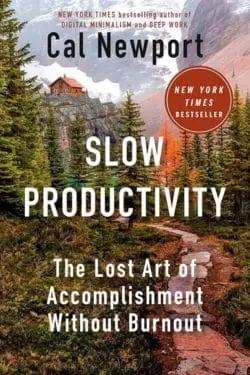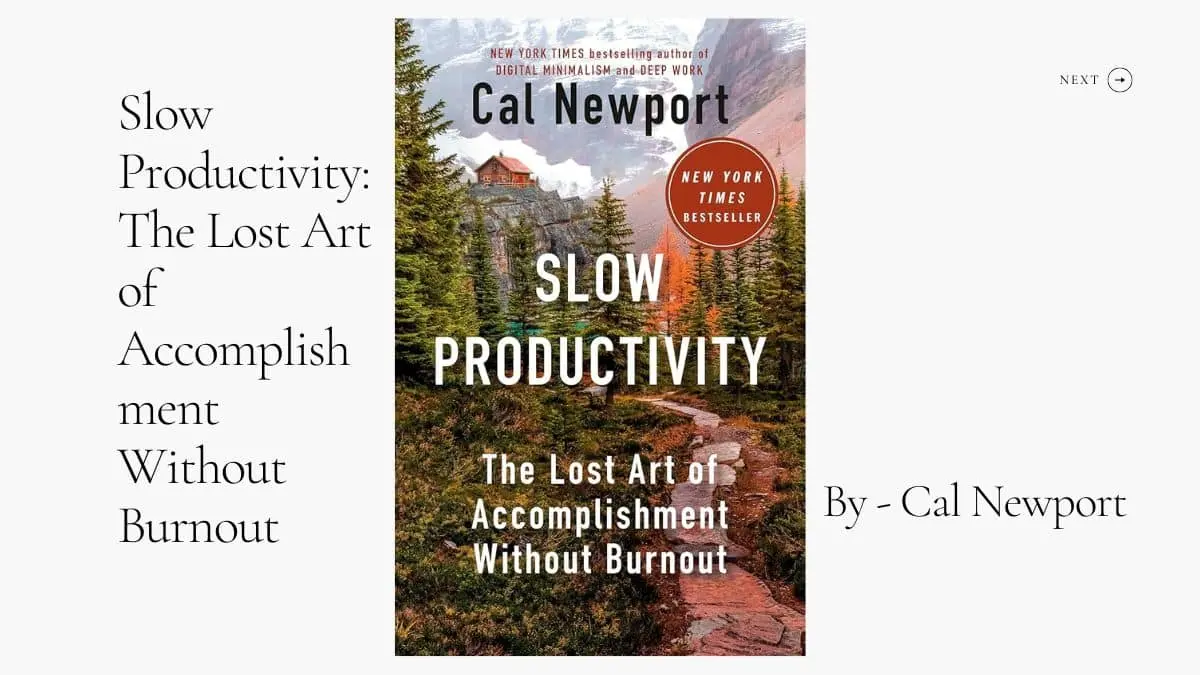Cal Newport’s “Slow Productivity: The Lost Art of Accomplishment Without Burnout” challenges the prevailing hustle culture by advocating for a more deliberate and meaningful approach to work. Drawing inspiration from historical figures and modern creatives, Newport introduces principles aimed at enhancing productivity without compromising well-being.
Understanding Slow Productivity
At its core, slow productivity is a philosophy that encourages individuals to:
- Do fewer things: Concentrate on a limited number of significant tasks rather than juggling numerous responsibilities.
- Work at a natural pace: Allow work to progress organically, avoiding the pressures of artificial deadlines.
- Obsess over quality: Prioritize excellence in output, even if it means declining additional opportunities in the short term.
Newport argues that the modern emphasis on constant busyness leads to “pseudo-productivity,” where visible activity is mistaken for genuine accomplishment. This mindset often results in burnout and diminished work quality.

Historical Insights and Modern Applications
To illustrate his points, Newport delves into the lives of renowned individuals who embodied the principles of slow productivity. For instance, he highlights how the Beatles, at the peak of their fame, chose to cease touring and dedicated extensive time in the studio. This deliberate focus culminated in the creation of “Sgt. Pepper’s Lonely Hearts Club Band,” a groundbreaking album that redefined modern music.
Similarly, Newport references writer John McPhee, known for spending weeks meticulously planning the structure of his articles, exemplifying the value of thoughtful preparation in producing high-quality work.
Addressing Pseudo-Productivity
A significant portion of the book critiques the concept of pseudo-productivity—the tendency to equate busyness with effectiveness. Newport contends that this misconception stems from the lack of clear productivity metrics in knowledge work, leading individuals to fill their time with visible but low-impact tasks.
He emphasizes that genuine productivity should be measured by the value and impact of one’s work, not the volume of tasks completed or the speed of execution.
Practical Strategies for Implementation
Newport offers actionable advice for adopting slow productivity:
- Limit obligations: Assess and reduce commitments to focus on what truly matters.
- Establish natural work rhythms: Recognize personal energy patterns and align tasks accordingly to maintain a sustainable pace.
- Prioritize quality over quantity: Invest time in producing exceptional work rather than aiming to complete numerous mediocre tasks.
He also suggests creating publicly accessible task lists to enhance transparency and reduce unnecessary communications, thereby minimizing the “work about work” that often consumes valuable time.
Reception and Critiques
“Slow Productivity” has garnered mixed reviews. Some readers appreciate Newport’s challenge to conventional productivity norms and his emphasis on sustainable work practices. However, others feel that the book reiterates concepts from his previous works without offering substantial new insights. Critics also note that while the historical anecdotes are engaging, they may not always be directly applicable to the average knowledge worker’s experience.
Conclusion
Cal Newport’s “Slow Productivity” serves as a thought-provoking critique of modern work culture, urging individuals to rethink their approach to productivity. By focusing on fewer tasks, working at a natural pace, and obsessing over quality, professionals can achieve human-experience-by-brene-brown-book-review/”>meaningful accomplishments without succumbing to burnout. While some may find the principles reminiscent of Newport’s earlier works, the book nonetheless provides valuable insights for those seeking a more intentional and fulfilling work life.author/show/147891.Cal_Newport”>
Also Read: The Ride of a Lifetime: Lessons Learned from 15 Years as CEO of the Walt Disney Company: By Robert Alan Iger (Book Review)




